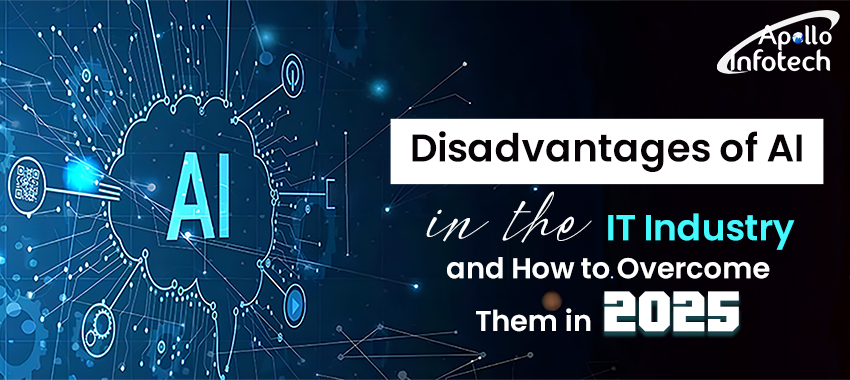
Disadvantages of AI in the IT Industry and How to Overcome Them in 2025
AI is transforming the IT industry by bringing about major advancements in automation, data analysis, and machine learning. However, despite its many benefits, AI also poses challenges that organizations need to address in order to use it effectively and ethically. Understanding the disadvantages of AI in the IT industry and strategies that can be used to counter them is therefore important in 2025.
Job Displacement and Automation
Among the biggest concerns in the IT industry with regards to the increasing presence of AI is the issue of job displacement. AI-driven automation can substitute human workers in repetitive or rule-based tasks, such as data entry, programming, and monitoring of the operation of systems. This will inevitably cause a huge number of job losses across industries characterized by minimal human inputs. By 2025, this will be one of the greatest challenges that businesses will have to overcome by reskilling and upskilling their workforce. Organizations need to invest in training programs that help employees transition into roles requiring higher-level cognitive skills, such as AI management, data analysis, and AI ethics. Fostering a culture of continuous learning and providing career growth opportunities will help companies ensure that their workforce evolves with technological advancements.
High Implementation Costs
Another significant disadvantage of AI in the IT industry is the high implementation costs associated with the implementation of AI systems. Developing, testing, and maintaining AI models can be expensive due to the need for specialized hardware, skilled talent, and significant computational resources. For smaller businesses or startups, these high upfront costs may make it difficult to integrate AI into their operations.
Lack of Transparency and Accountability
AI systems are often criticized for their lack of transparency and accountability. Machine learning models, especially deep learning algorithms, are complex and hard to understand even for experts. This black-box nature of AI makes it challenging to track how decisions are made, which can pose ethical concerns, especially when AI is used in sensitive areas like healthcare or finance. In 2025, XAI is likely to be one solution to this problem. XAI is a category of AI that will focus on making models to explain decisions clearly and give reasons for making them, therefore making the processes more transparent and accountable. The XAI principles shall ensure that all AI systems implemented are fair, ethical, and trustworthy. In this regard, companies must develop solid governance frameworks that clearly define accountability measures for deploying AI. Thus, there would be human oversight in decision-making processes.
Data Privacy and Security Risks
To operate effectively, AI systems typically need access to vast amounts of data. Data privacy and security risks arise from this fact. With growing volumes of personal and sensitive data processed by AI, the threat of data breaches and unauthorized access grows with each passing day. The more data AI systems collect, the higher the risk of misuse or exploitation of that data.
The business must, therefore, take a robust approach toward data protection measures such as encryption and anonymization of sensitive information. In 2025, AI systems have to be designed with data privacy in mind to ensure compliance with global data protection regulations, such as the General Data Protection Regulation (GDPR). Organizations can reduce the risk of data breaches by adopting privacy-centric AI development practices and conducting security audits regularly to establish trust with users.
Ethical Concerns and Bias in AI
Bias in decision-making can be furthered unintentionally by AI systems. This typically occurs when AI is trained on biased data. The implications of this can result in unfair outcomes for applications such as hiring, credit scoring, and law enforcement procedures. Societal implications arise as well and can cause public distrust of AI-based models.
It will be in 2025 when AI bias will be overcome by a great commitment to the ethical development of AI. Organizations need to make sure that their AI systems are trained on diverse and representative datasets so that the bias can be reduced. Businesses should incorporate regular audits and testing to identify and address any biases that may emerge in their models. Collaboration with ethicists, social scientists, and diverse teams will ensure that AI systems are designed to be inclusive and fair.
Over-reliance on AI
The increasing integration of AI in the IT industry leads to the possibility of over-reliance on AI. Businesses tend to forget the value of human judgment and intuition if they rely too much on AI. AI is a strong tool, but it is not foolproof. Over-reliance on AI might cause catastrophic effects when human expertise is required.
Conclusion
The disadvantages of AI in the IT industry are major but not impossible to overcome. Reskilling, investing in affordable AI solutions, promoting explainable AI, data privacy, removing bias, and human-AI collaboration can all help businesses ride the wave that AI brings. Companies like Apollo Infotech – Top IT Solutions Company are shaping the future in 2025 with AI solutions that are innovative, ethical, transparent, and secure. It will be critical to ensure that it is beneficial for both businesses and society at large when the future of the IT industry is shaped by AI and its disadvantages are addressed.



